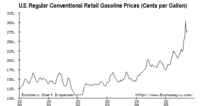Wednesday, September 28, 2005
How much confidence in consumer confidence?
Today, we got the first look at the data, and it ain't that pretty at all, as Warren Zevon might have said.
�Hurricane Katrina, coupled with soaring gasoline prices and a less optimistic job outlook, has pushed consumer confidence to its lowest level in nearly two years (81.7 in October 2003) and created a degree of uncertainty and concern about the short-term future,� says Lynn Franco, Director of The Conference Board Consumer Research Center. �Historically, shocks have had a short-term impact on consumer confidence, especially on consumers� expectations. Fuel prices remain high, though they have retreated in recent days, and when combined with a weaker job market outlook, will likely curb both confidence and spending for the short-run. As rebuilding efforts take hold and job growth gains momentum, consumers� confidence should rebound and return to more positive levels by year-end or early 2006.�And yes, there's some turnaound already showing up in retail chain-store sales, but it's barely perceptible. And some observers are getting nervous.
"We may now see a pullback in spending,'' said Quincy Krosby, who helps oversee $293 billion in assets as chief investment strategist for The Hartford in Hartford, Connecticut. "This winter and this Christmas shopping season are going to be the test case, and we're going to see if this is the tipping point for the consumer.''Is this justified? Call me cautious. If you want to be optimistic, you would look to the research that suggests consumer confidence tells us rather little. If you gauge on nothing else, yes, consumer confidence can help explain consumption, which is the key right now to continued economic growth. But we already have forecasts that suggest a quarter-point downshift in consumption. This is forecast to be offset by a decline in the trade deficit, as one thing consumers will cut back on in the scenario will be imported goods.
If you want to be pessimistic, you could point to a speech by the Chicago Fed president Michael Moskow, where he argues that we could see a 0.3-0.5% decline in GDP growth in the second half of 2005, arguing that it's an order of magnitude larger than Hurricane Andrew (which nobody thought took more than 0.1% from GDP growth.) And you could base it on conversations I'm having with people around town that suggest people aren't going to restaurants as much as they did a year ago and otherwise reducing discretionary spending ... but this was happening even before Katrina. The reason you hear is simply this graph.
 Which camp am I in? I'd characterize myself as someone with a foot in each. I think the pessimists have the day in the short-run, and I agree with Chicago Fed President Moskow. And the story that we've seen the bottom of the slide in the trade deficit has some 'splainin still to do. But in the long run we should get more work, more savings and investment.
Which camp am I in? I'd characterize myself as someone with a foot in each. I think the pessimists have the day in the short-run, and I agree with Chicago Fed President Moskow. And the story that we've seen the bottom of the slide in the trade deficit has some 'splainin still to do. But in the long run we should get more work, more savings and investment. 








